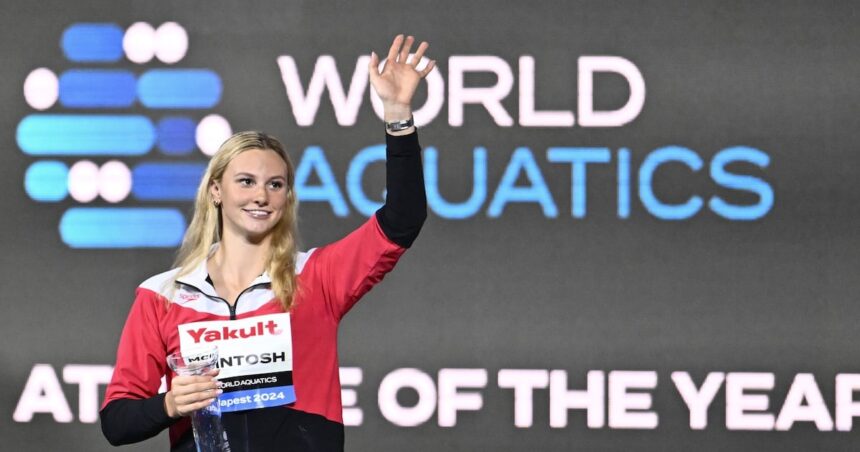When I stepped into the Budapest Duna Arena last Thursday evening, the atmosphere crackled with anticipation. Not simply because it was the World Aquatics Championships, but because a young Canadian was about to remind the world that age is merely a number in the relentless pursuit of excellence.
Summer McIntosh, now 19, shattered her own world record in the women’s 400-metre individual medley with a time of 4:24.31, eclipsing her previous mark of 4:25.87 set last year in Toronto. The crowd erupted as the scoreboard confirmed what many swimming insiders had whispered was coming – McIntosh’s trajectory continues to bend the boundaries of what we thought possible in the pool.
“I honestly wasn’t focusing on the time,” McIntosh told reporters, water still dripping from her cap. “I just wanted to execute my race plan and see where that took me. When I touched the wall and saw the time, it was pretty surreal.”
The Toronto native has matured since bursting onto the international scene as a 14-year-old at the Tokyo Olympics. Her confidence is evident but never crosses into arrogance – a balance that has endeared her to teammates and competitors alike.
Swimming Canada high-performance director John Atkinson didn’t mince words when assessing McIntosh’s performance. “What we’re witnessing is generational talent combined with extraordinary work ethic. Summer’s attention to technical details in all four strokes gives her an edge that few can match.”
The numbers tell a compelling story. McIntosh pulled away during the backstroke leg and created an insurmountable lead in the breaststroke portion – traditionally considered her “weaker” stroke. By the time she launched into the freestyle leg, the only question remaining was how much time she would slice from her previous record.
Katie Ledecky, the American swimming icon who knows something about dominance, offered praise that carried particular weight. “Summer represents the future of our sport. The way she attacks each race, each stroke – it’s inspiring even for veterans like me.”
Perhaps most impressive is how McIntosh has handled the weight of expectations. After collecting four medals at the 2022 Commonwealth Games and multiple world championship podiums, the pressure to deliver could have derailed a less centered athlete.
Fellow Canadian Kylie Masse, a backstroke specialist and Olympic medalist, has witnessed McIntosh’s evolution firsthand. “Summer came into our national team environment so young, but she soaked up everything like a sponge. Her ability to compartmentalize pressure and just focus on racing is something many swimmers twice her age haven’t mastered.”
According to Swimming Canada statistics, McIntosh’s time represents a 1.2% improvement over her previous record – significant in a sport where progress is typically measured in hundredths of seconds. Her coach, Ryan Mallette, noted that they’ve been refining her underwater transitions, which may have accounted for nearly half a second of the improvement.
The timing of this record-breaking swim couldn’t be better, coming just weeks before the Paris Olympic Games. McIntosh will enter as a medal favorite in multiple events, though she remains characteristically measured about her prospects.
“Paris is definitely on my mind, but I’m trying to stay present and enjoy each competition as it comes,” she said during the post-race press conference. “Records are amazing, but they’re meant to be broken – even your own.”
What separates McIntosh from many prodigies is her versatility. The 400 IM demands excellence across all four swimming strokes – butterfly, backstroke, breaststroke, and freestyle. Many specialists might excel in one or two disciplines, but McIntosh’s across-the-board proficiency recalls swimming legends like Hungary’s Katinka Hosszú, who was, coincidentally, watching from the stands in Budapest.
The Canadian swimming contingent has enjoyed a renaissance in recent years, with Penny Oleksiak, Masse, Maggie Mac Neil, and now McIntosh leading the charge. Swimming Canada reports a 23% increase in youth swimming registrations since 2021, suggesting these success stories are inspiring the next generation.
Sport Canada funding has played a role in this resurgence, with nearly $11 million allocated to swimming programs in the current Olympic cycle, according to federal sports ministry data. The investment appears to be paying dividends beyond medal counts.
McIntosh’s record-breaking performance will undoubtedly feature prominently in CBC’s Olympic coverage plans. The public broadcaster has already begun promotional spots highlighting Canada’s swimming stars, with McIntosh receiving significant attention.
As the Budapest competition continues, McIntosh will have opportunities in other events to further cement her status as a multi-disciplinary threat. Whether additional records fall remains to be seen, but her impact on Canadian swimming is already indelible.
For a country that has historically lived in the shadow of swimming powerhouses like the United States and Australia, McIntosh represents something beyond medals and records – she embodies the possibility that with the right combination of talent, support, and determination, Canadian athletes can rewrite the record books and reshape our sporting expectations.
As I watched McIntosh during her victory lap, waving to fans with that characteristic mix of joy and humility, I couldn’t help but think we’re witnessing history in real time. Sometimes, sports writing transcends the mere reporting of times and achievements – this feels like one of those moments when we’re chronicling the emergence of an athlete whose name may someday be mentioned alongside the all-time greats.
The clock read 4:24.31. The swimming world took notice. And a 19-year-old Canadian just kept smiling, already focused on the next challenge.






